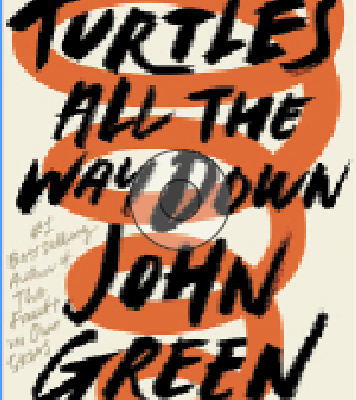It’s been five years since John Green released his last novel “The Fault in Our Stars.” However, in his latest novel, “Turtles All the Way Down,” Green returns with what I consider to be his most honest and down-to-earth work yet. “Turtles” follows 16-year-old Aza Holmes as she works to solve a mystery, navigate a newfound relationship and most importantly, deal with the ramifications of her Obsessive Compulsive Disorder. Having read all of John Green’s previous novels, I had several points of comparison for this particular one and I can say unequivocally that it is his best yet.
The majority of the criticism Green gets for his novels is his overall pretentiousness; his teenage protagonists speak in near constant metaphors, his storylines romanticize mental illnesses and the way he crafts his story is self-important and overdone. And yes, “Turtles All the Way Down” does feature quite a bit of that metaphorical dialogue, featuring high school students speaking about the complexities of personal identity in the place an average conversation without so much depth would reside. However, for someone who has read his books and even watched his YouTube videos, I can say that Green uses his various platforms to do the exact opposite of romanticize mental illnesses and those featured with them in his books. His first novel, “Looking For Alaska” and “The Fault in Our Stars” feature this theme quite prominently, discussing how one’s brokenness does not define them underneath admittedly flowery prose and “Turtles” is no exception. If anything, his latest work is his most successful attempt at truly parsing out this brand of brokenness that haunts Aza.
This is what makes “Turtles” stand out from his other books; in his other works, Green has included details about himself and his life, from “Looking for Alaska” featuring the boarding school he attended to the protagonist of “The Fault in Our Stars” living in his current home of Indianapolis. But in this work, Green gives Aza the same condition and fears that he himself lives with every day, trying to put the pain of his obsessive compulsions into words that would resonate with his readers. He said as much in an interview with The New York Times upon the release of the book, saying, “I want to talk about it, and not feel any embarrassment or shame … because I think it’s important for people to hear from adults who have good fulfilling lives and manage chronic mental illness as part of those good fulfilling lives.” Because of this direct and personal connection that he shares with the audience through Aza, this is undeniably his most honest novel to date. There is nothing romantic or pretentious about the details of Aza’s illness: she obsesses over a cut on her finger that she is convinced will become infected and kill her, she gets trapped in thought spirals that she doesn’t recognize as her own and cannot escape and mundane everyday activities like eating lunch cause her internal strife.
“Turtles” is classically John Green; there are deep, beautifully worded one-liner quotes fit for a t-shirt placed in between quirky humor and a compelling subplot that drives the arc of the story. But it is also Aza and John Green’s story; it’s scary, heartbreaking and eye-opening for those who don’t have these compulsive, inescapable thoughts that control every part of their lives. Green lets the reader into this dark place, painting a mental illness such as OCD as one that is ever-present. As he states in the previously mentioned New York Times article, “It’s not a mountain that you climb or a hurdle that you jump, it’s something that you live with in an ongoing way … people want that narrative of illness being in the past tense. But a lot of the time, it isn’t.” And in that same John Green spirit, it is not to be looked at without a glimmer of hope. It gives a voice to those living with these same experiences and it gives readers who haven’t felt these things a better understanding and compassion for them. Green triumphs, both in storytelling and in significance in this latest novel, and has created a poignant piece for any reader.
Rating: 5 out of 5 stars


Leave a Reply